Report
2025 Legislative Sessions to Date: Key Election Policy Trends
The Trump administration’s efforts to overhaul our elections — from the DOJ’s sweeping requests to review state voter rolls to an executive order seeking to make it harder to register to vote and cast a ballot — have gained widespread media attention in the first six months of the year. However, when it comes to how our elections are run, the real action is taking place where it always does: in state legislatures.
What we’re seeing should concern everyone who cares about elections: President Donald Trump’s allies have taken his blueprint to undermine free and fair elections — and run with it.
In 2025, we’ve seen a significant shift in the makeup of election laws enacted by state legislatures. Since our team began systematically tracking legislation in all 50 states in 2021, each year we saw more than twice as many new laws expanding access to the ballot as new laws restricting it. That trend ended this year, with only one in three new laws improving voter access and election administration in 2025, the lowest percentage we’ve ever recorded.
The team behind our Election Policy Tracker identified several significant trends in restrictive legislation this year, including requiring voters to show proof of citizenship when registering to vote, eliminating grace periods for mail ballots submitted on or before Election Day, and removing forms of voter ID that many rely on. While legislation related to mail voting is generally down compared to recent years, we’ve seen heightened attacks on military and overseas voters. In addition, one state enacted the most significant rollback to mail voting since our legislative tracking began in 2021.
In this report:
- Tipping the Scale: Restrictions Make Up Greatest Share of Enacted Bills Since Tracking Began
- President Trump’s Elections Agenda Infiltrates State Legislatures
- Restricting Forms of Voter ID
- Utah Reverses Course on Mail Voting, Also Taking Cues from President Trump
- It’s Not All Bad News
- Federal Meddling Adds Fuel to the Fire
Tipping the Scale: Restrictions Make Up Greatest Share of Enacted Bills Since Tracking Began
While the number of state election laws passed as of June 30 of this year is nearly identical to those passed at the same point last year, the landscape has shifted dramatically. Compared to the first half of 2024, we saw not only fewer laws improving voter access enacted, but the number of restrictive laws enacted increased by 50 percent.
While proof of citizenship — the centerpiece of Trump’s executive order on elections — largely failed in state legislatures this year after receiving pushback from advocates, many restrictive laws passed under the radar. This did not happen by accident. Rather, it demonstrates the astounding influence of Trump’s agenda on the states.
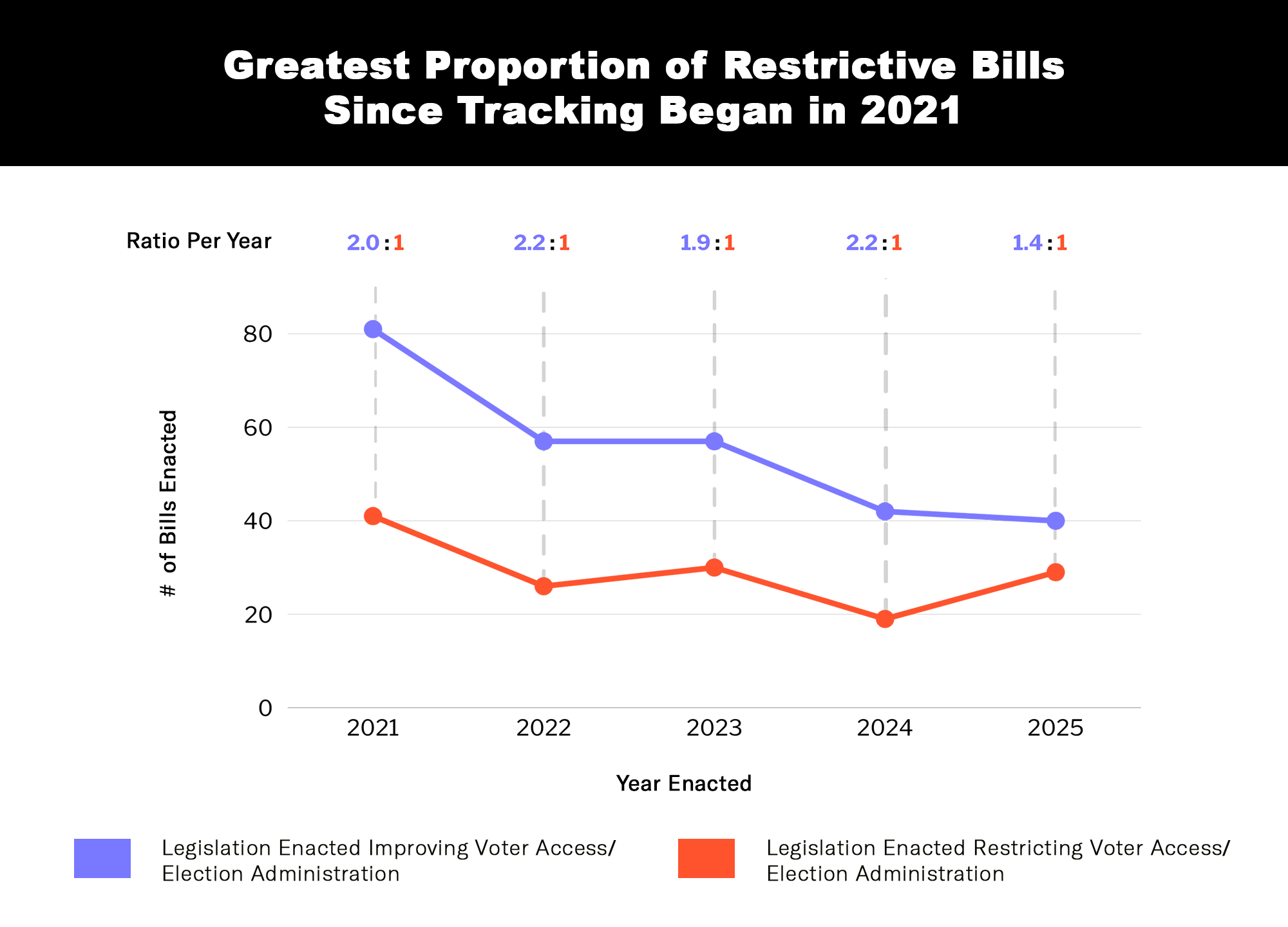
2025 By the Numbers
- Laws enacted: 120
- Voting-eligible Americans living in states that enacted restrictive laws: 58.7M
- States that considered restrictive proof of citizenship laws: 27 (nearly four times the number in 2023)
- States that enacted restrictive proof of citizenship laws: 2
- States that considered laws restricting forms of voter ID: 20
- States that enacted laws restricting forms of voter ID: 7
- States that considered Election Day mail ballot receipt deadlines: 12
- States that enacted Election Day mail ballot receipt deadlines: 3
- Percentage of election bills that passed a chamber in key 2026 battleground states that are restrictive: 50%
- Election-related bills enacted in Republican-controlled states: 76
- Election-related bills enacted in Democratic-controlled states: 25
- Election-related bills enacted in split-control states: 19
*As of June 30, 2025.
President Trump’s Elections Agenda Infiltrates State Legislatures
The most controversial provisions in Trump’s executive order on elections have been challenged in court, and those imposing the most significant burdens on voters have been struck down. The SAVE Act — federal legislation that would have established a proof of citizenship requirement on the federal voter registration form — also stalled in Congress this year.
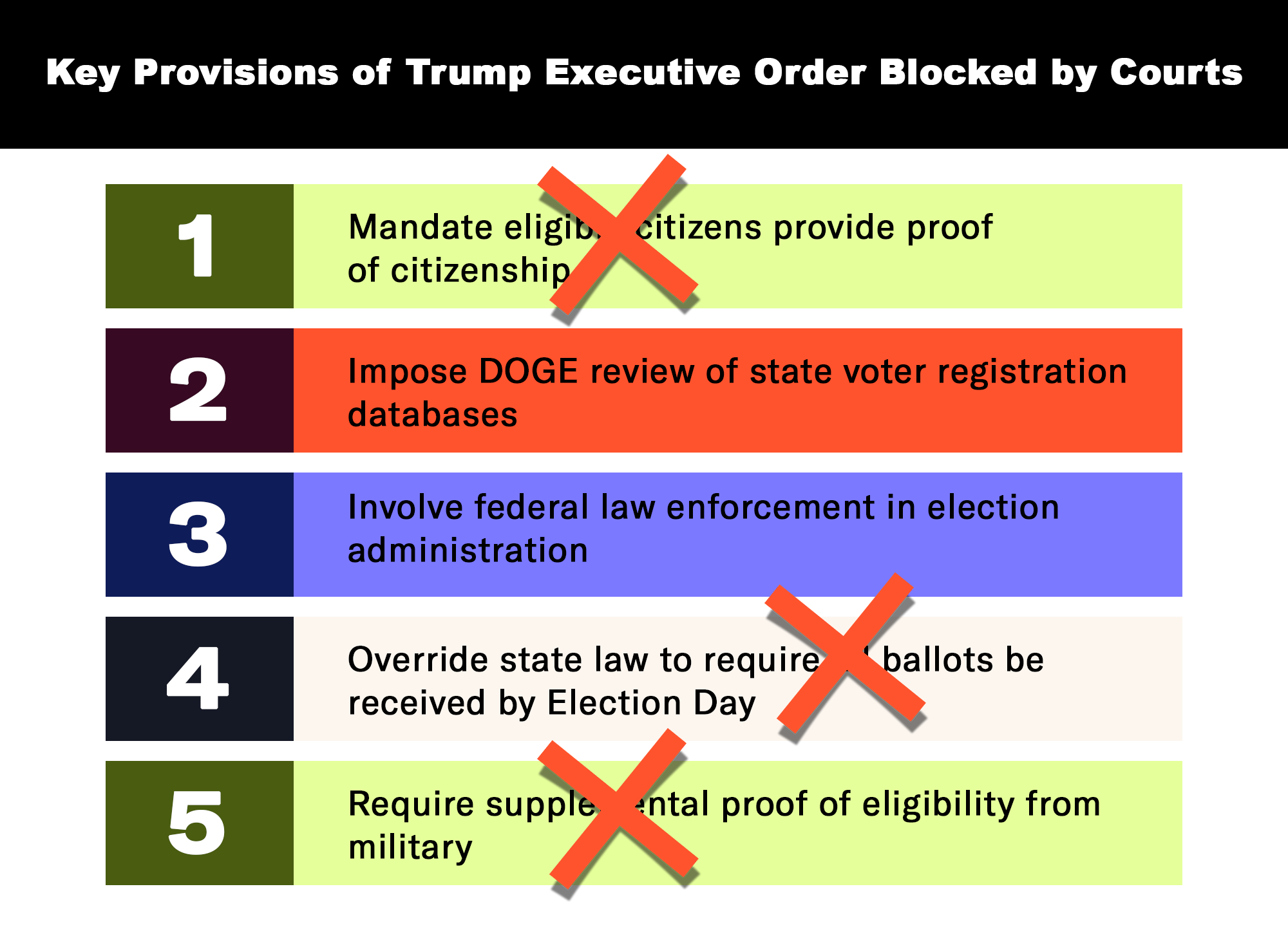
Even as the courts and Congress have blocked the president’s agenda federally, state legislatures across the country have kept it alive. From a surge of proof of citizenship bills to attacks on military and overseas voters, many state legislators have made the president’s agenda their own.
Proof of Citizenship Mandates
Proposed requirements that voters provide election officials with documentation proving their U.S. citizenship in order to register to vote pose a serious threat to the freedom to vote. Research shows proof-of-citizenship mandates could block millions of voting-eligible citizens from casting a ballot, especially low-income and rural individuals, married women, and seniors. Past state attempts to implement such laws have led to cumbersome and confusing registration procedures, threatening to block eligible voters from registering at all.
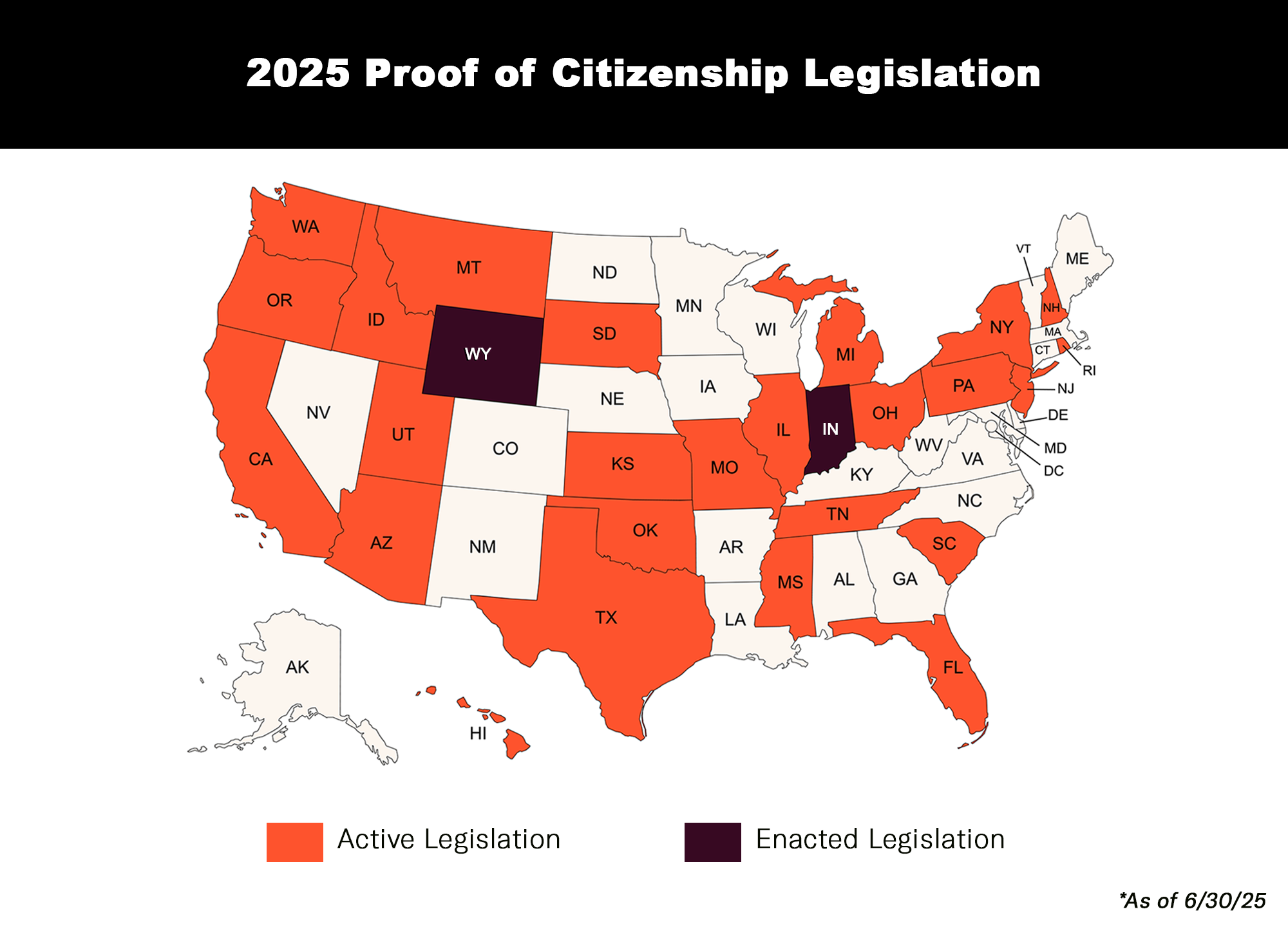
Despite the well-documented harm, these policies exploded in state legislatures this year, with 27 states considering some type of restrictive proof of citizenship law. Of these states, 19 considered a generally applicable proof of citizenship requirement to register to vote. This is nearly four times the number of states that considered these laws in 2023.
Only two states — Wyoming and Indiana — enacted proof of citizenship laws this year (and both were significantly less restrictive than most state bills on the subject, or the SAVE Act); however, the sheer volume of bills on this subject sends a clear signal that this threat isn’t going away anytime soon.
In Texas, a dangerous bill that our experts warned would impose the most restrictive voter registration mandates in a generation stalled in the House after passage in the Senate. This unprecedented bill would have required all currently registered voters to produce proof of citizenship or be removed from the rolls. A similar bill in Florida ultimately failed after legislators focused their efforts on significant changes to the state’s ballot initiative process.
Election Day Ballot Receipt Deadlines
Across the country, states considered laws that would bar election officials from counting ballots received after Election Day, even if they are postmarked on or before Election Day. In many states, this change gives voters far less time to return their mail ballots and could result in officials tossing out tens of thousands of otherwise-valid votes.
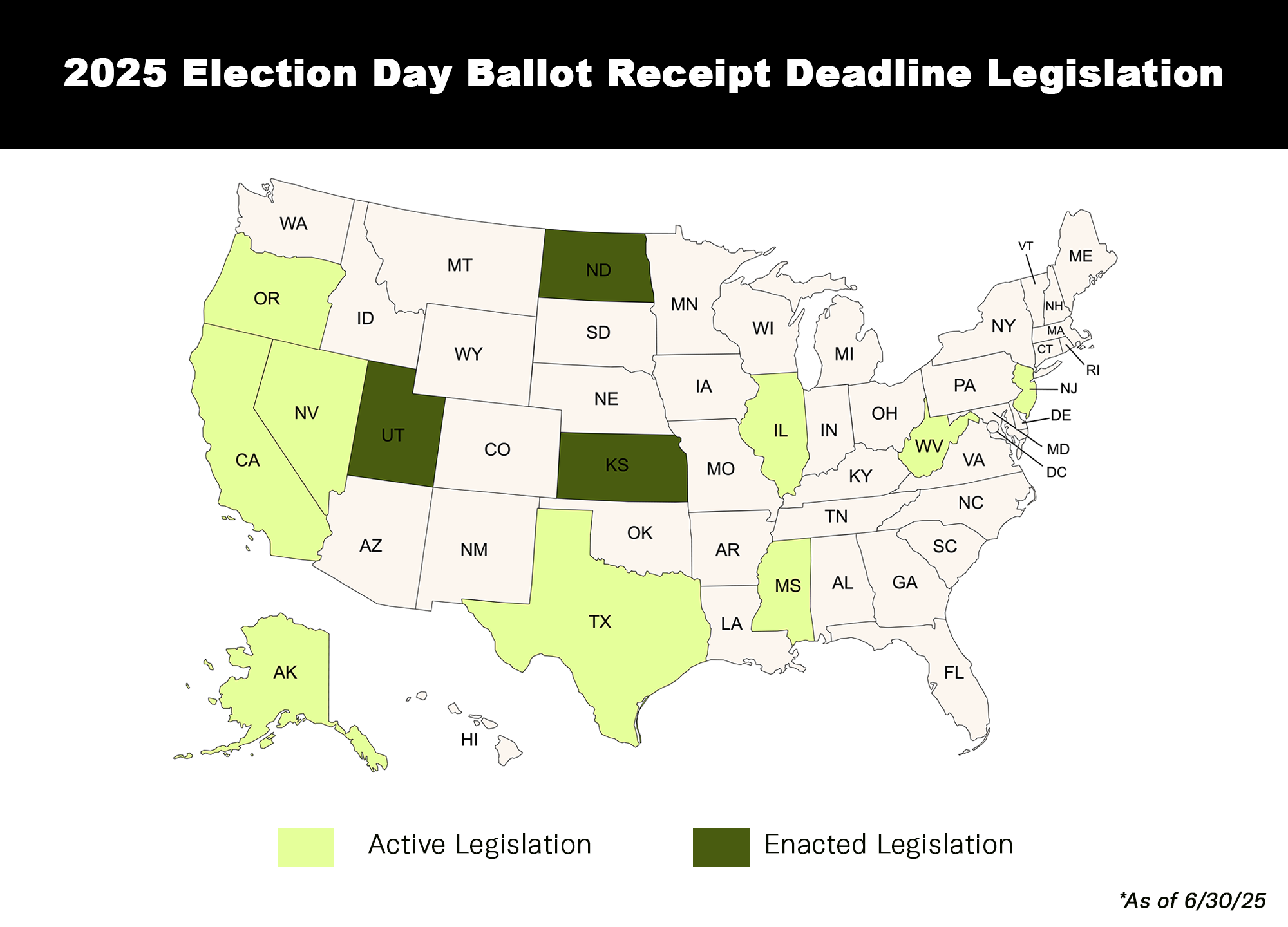
In 2025, lawmakers in 12 states — out of 18 that started the year with postmark deadlines — have considered bills that would require that ballots be received by the close of polls, regardless of when the voter put them in the mail. Three of these states — Kansas, North Dakota, and Utah — eliminated their postmark grace periods, directing officials to toss out ballots received after the close of polls on Election Day, even if they were submitted by the voter and postmarked well in advance.
While these policies are promoted as a means of speeding up election results, there are better ways for states to improve efficiency while ensuring all eligible voters are counted. For example, states can allow election officials to start processing mail ballots earlier. They can invest in infrastructure and staffing to handle the growing number of mail ballots. And they can educate voters and improve tracking systems, so no one is left in the dark about whether their vote was counted. None of these practical solutions requires throwing out lawfully cast ballots.
Attacks on Military and Overseas Voters
On the campaign trail last year, Trump claimed — without evidence — that “anyone [overseas] can get a ballot emailed to them” even if they are ineligible to vote. This false narrative became the justification for a key provision of his executive order on elections, which called for the Department of Defense to amend the Federal Post Card Application, which military and overseas voters may use to register to vote and apply for their home state’s mail ballot. The order seeks to require servicemembers and other Americans living abroad to submit documents proving their citizenship and eligibility to vote in the state where they are applying to vote.
This order spurred state-level attacks on overseas and military voters in Arizona, Indiana, North Carolina, Tennessee, and Texas. These proposals would add new voting hurdles for people living abroad or serving overseas, such as proof of citizenship and proof of overseas residency. While none of these bills passed this year, they set a dangerous precedent. For example, in North Carolina, Judge Jefferson Griffin demanded the courts toss thousands of military votes in a case that dragged on for months. Griffin eventually conceded in response to a federal court order, but blatantly partisan attempts to overturn elections by challenging ballots cast by Americans stationed or living abroad could reappear in 2026.
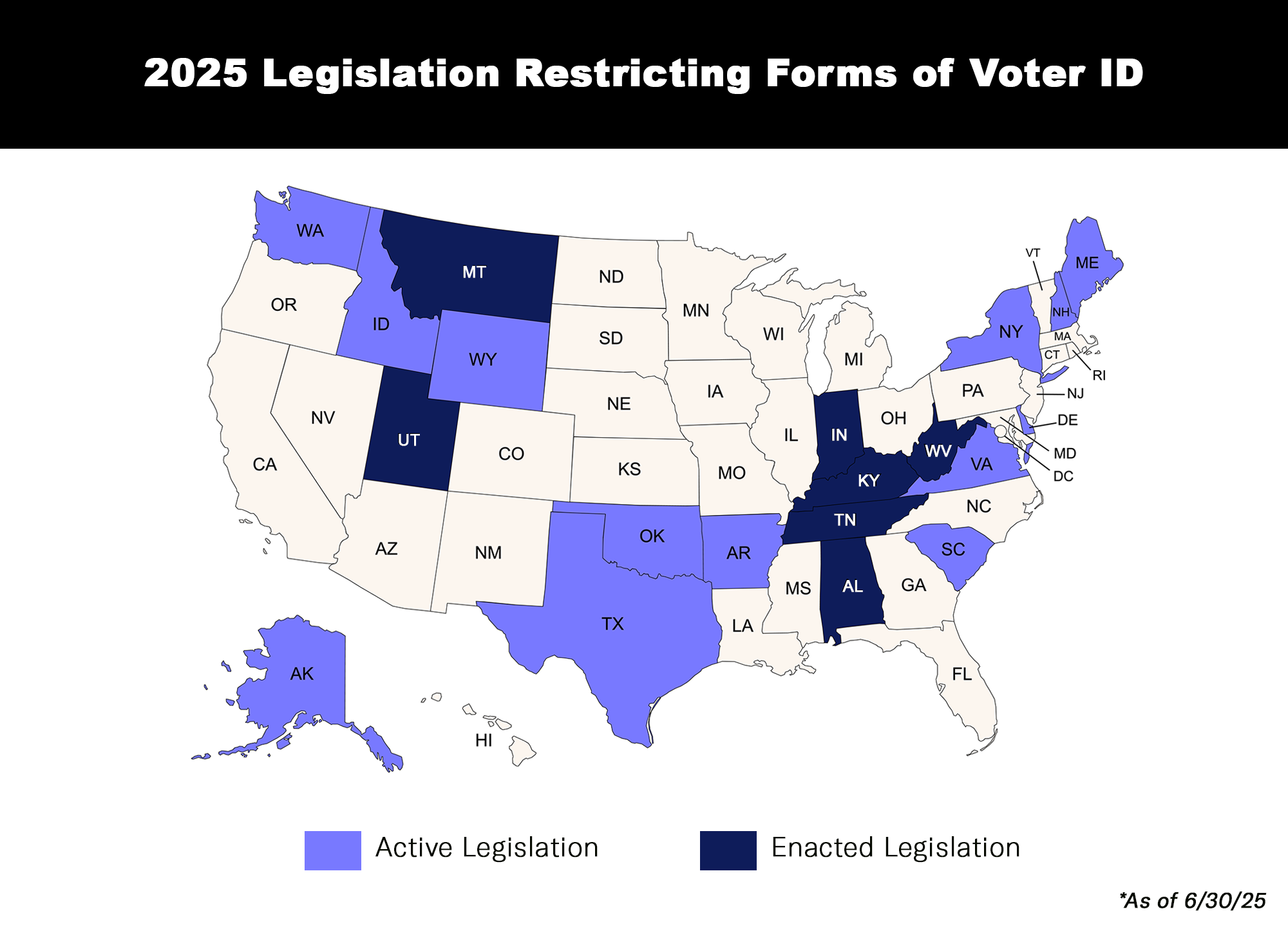
Restricting Forms of Voter ID
Creating more stringent voter ID laws is also a key trend to watch as we prepare for 2026. While the majority of states have some type of voter ID law, in 2025, we’ve seen states make their existing laws significantly more restrictive by limiting the types of documents voters may use to verify their identity and eligibility. Having options available to voters — such as a current lease, utility bill, or student ID — is critically important to ensure that voters aren’t turned away because of a recent move or an expired driver’s license.
As of June 30, 20 states have considered legislation, and seven states have enacted new laws, making existing ID requirements stricter, whether by limiting what qualifies as ID or eliminating alternatives for otherwise eligible voters who do not have a qualifying ID. Kentucky, Montana, and West Virginia eliminated non-photo ID options. Indiana prohibited the use of student IDs as voter ID, while Utah passed a law that both restricts the list of acceptable IDs for in-person voting and adds a requirement that mail voters provide a driver’s license or Social Security number. In late June, the New Hampshire legislature passed a bill that would require mail voters to provide a photocopy of an ID document or have their signatures notarized, setting it up for the governor to sign it into law or veto.
Even states that already had strict voter ID requirements on the books took steps to tighten them further. In Wisconsin, voters approved an amendment to the state constitution to enshrine the state’s photo ID requirement in the Wisconsin Constitution. This ties the hands of the legislature, preventing future changes to the types of ID documents accepted.
Utah Reverses Course on Mail Voting, Also Taking Cues from President Trump
In 2021 and 2022, nearly every state in the country enacted legislation related to mail voting. This wave of legislation was, in large part, a response to Trump’s disinformation campaign against mail voting after losing the election in 2020. Although broad attacks and legislation on mail voting have declined since then, 2025 saw the most significant mail voting rollback since we began tracking legislation.
This year, Utah became the first state to end universal mail ballots after resisting national pressure to do so over the past few years. ”Universal mail ballots” refers to the practice of sending a mail ballot to every voter. Voters do not necessarily need to use that ballot to cast their vote, but each voter receives one.
Utah has a unique history with universal mail voting. In 2012, the state enacted a law giving each county the option to send mail ballots to all voters. By 2020, when the policy became statewide, every county had already voluntarily opted in. Then, this March, a mere five years after formally adopting the popular policy and under intense national pressure, the state enacted H.B. 300 — legislation that not only repeals universal vote-by-mail, but prohibits counties from sending their voters a ballot in the mail unless they specifically request one, overriding the policy that each county voluntarily adopted in the 2010s.
It’s Not All Bad News
While restrictive policies dominated the election policy landscape, 2025 wasn’t entirely without progress. Below are a few bright spots from this year:
Voting Rights Restoration: Virginia lawmakers adopted a constitutional amendment to restore voting rights for Americans with past felony convictions. Virginia is currently one of only four states where a person’s freedom to vote is permanently stripped due to a felony conviction. If the proposal passes the legislature again next year, it will go before voters in 2026. In Tennessee, lawmakers passed bipartisan legislation that decoupled voting rights restoration from the restoration of gun rights, giving judges more discretion to restore voting rights to citizens.
Early Voting Expansion: Arkansas and Texas lawmakers enacted new laws expanding access to early voting. In addition, a promising bill to expand early voting passed the Senate in Mississippi. Though the bill ultimately failed, this movement is significant in a state that is currently one of just three remaining without any in-person early voting period.
Colorado Voting Rights Act: Colorado took proactive steps to secure the freedom to vote for its residents by passing its own Voting Rights Act. This law establishes new protections for people of color and other protected classes and requires accommodations for people with disabilities. The measure also ensures incarcerated voters have the right to vote while in custody and strengthens access for voters who live on tribal lands in the state.
Vetoed*
In states with split governments, governors used their veto pens to block various pieces of election-related legislation. The following states will hold gubernatorial elections in the next 18 months. If control shifts, any vetoed bills could resurface and quickly become law:
- In Virginia, Gov. Glenn Youngkin vetoed six bills that would have improved voter access and the smooth certification of elections, among other proactive reforms.
- In Arizona, Gov. Katie Hobbs vetoed multiple Trump-aligned proposals, including one that would have expanded the state’s proof of citizenship requirement to federal elections.
- In Nevada, Gov. Joe Lombardo vetoed several bills that would have expanded the availability of drop boxes and required all voters to show a photo ID, among other proposals that would have strengthened voting access in the state.
*As of June 30, 2025
Federal Meddling Adds Fuel to the Fire
In a series of escalating moves, the Trump administration has threatened legal action against over a dozen states over their voter registration practices, demanded access to state voter rolls, and filed lawsuits that could lead to mass voter purges. The Department of Justice has also weighed the use of criminal charges against election officials who fail to comply.
These federal actions, combined with alarming activity in the states, pose a serious threat to free and fair elections in 2026. As we continue tracking these developments in real-time, we remain committed to defending and expanding the freedom to vote for all Americans.
Author: Chris Diaz